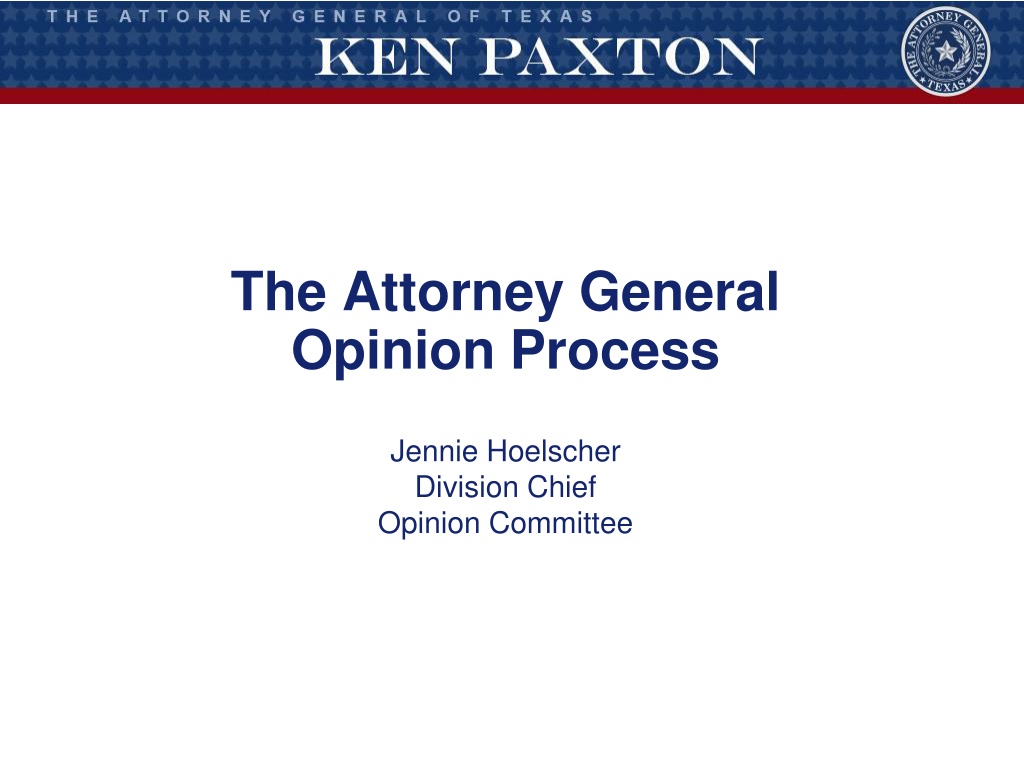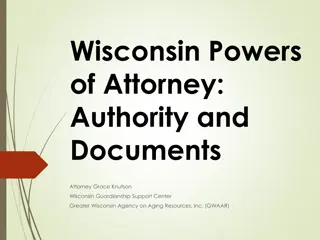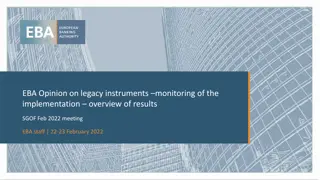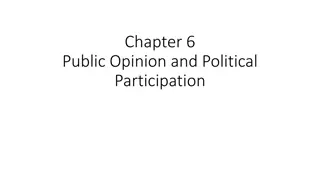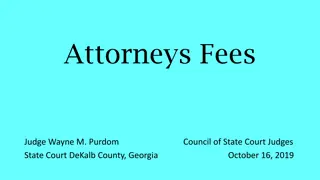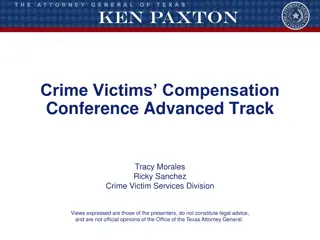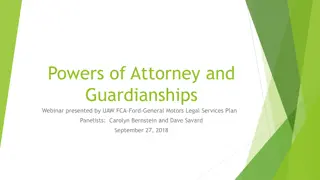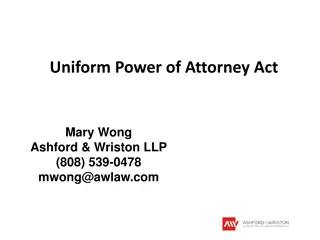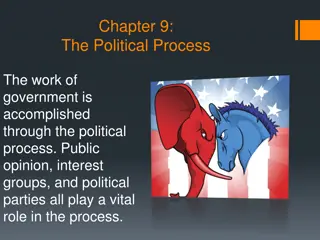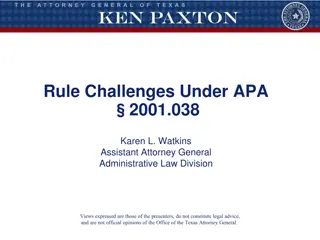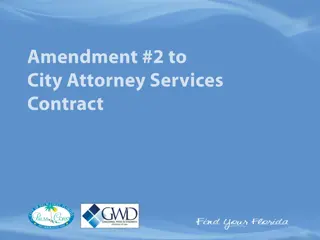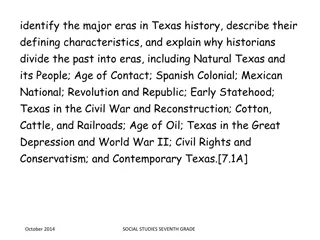Understanding the Attorney General Opinion Process in Texas
The Attorney General of Texas provides legal advice in writing to the Governor and other executive officers upon request. Various entities, including state agencies, can request opinions on matters related to public interest and official duties. Limitations exist on who can request opinions and the topics that can be addressed. Recent opinions cover a range of issues, such as vacation leave policies and conflict-of-interest rules for board members.
Download Presentation

Please find below an Image/Link to download the presentation.
The content on the website is provided AS IS for your information and personal use only. It may not be sold, licensed, or shared on other websites without obtaining consent from the author. Download presentation by click this link. If you encounter any issues during the download, it is possible that the publisher has removed the file from their server.
E N D
Presentation Transcript
The Attorney General Opinion Process Jennie Hoelscher Division Chief Opinion Committee
Legal Authority for AG opinions The Attorney General shall . . . give legal advice in writing to the Governor and other executive officers, when requested by them, and perform such other duties as may be required by law. Article IV, 22 of the Texas Constitution
Who may request an AG opinion? Governor Head of a department of state government Head or board of a penal institution Head or board of an eleemosynary institution Head of a state board Regent or trustee of a state educational institution Committee of a house of the legislature County auditor Chair of the governing board of a river authority District or county attorney
State Agency Requestors With regard to state agencies, we accept requests from either the Executive Director or the appointed or elected head of the state agency or board. Chairman, Texas Department of Motor Vehicles Board Executive Director, Commission on Jail Standards Commissioner, Texas Education Agency President, Texas Medical Board If a board has more than one member, the chair or presiding officer of the board should request the opinion.
Limitation on Opinion Authority The Attorney General may not give legal advice or a written opinion to a person other than a person named in chapter 402, subchapter C, of the Government Code. Section 402.045 of the Government Code
Appropriate Opinion Request Topics Questions affecting the public interest Questions concerning the official duties of the requesting person Questions addressing the meaning of current law
Recent Opinions Slide 1 of 3 KP-0268, President, Texas Southern University Authority to pay for unused vacation leave after employee separation KP-0266, President, Texas Medical Board Regulatory authority over the administration of anesthesia when delegated by a physician to a nurse anesthetist KP-0259, Chair, Texas State Soil and Water Conservation Board Application of conflict-of-interest rules to board members
Recent Opinions Slide 2 of 3 KP-0257, Cooke County Auditor Ability of a county to charge a fee for the use of credit cards in collecting costs owed to the county KP-0255, Executive Director, Texas Historical Commission Authority to permit the destructive testing of human remains for research purposes, including for the purpose of obtaining DNA samples to enable identification of remains KP-0254, Commissioner, Texas Education Agency Availability of civil remedies for violations of the Texas Open Meetings Act
Recent Opinions Slide 3 of 3 KP-0251, Webb County Attorney Eligibility to run for office after a felony conviction KP-0243, President, Texas Medical Board Legal representation for an advisory committee and indemnification under the Civil Practices and Remedies Code KP-0236, Chair, Senate Committee on Intergovernmental Relations Whether Texas Southernmost College may acquire and hold title to land from the General Services Administration through the Federal Lands to Parks Program
Inappropriate Opinion Questions Questions requiring the resolution of facts Questions currently the subject of pending litigation Questions requiring the construction of contracts or local ordinances
What should a request look like? No specific formatting requirements exist. Include relevant legal authorities and background information necessary to answer the request. The more information provided, the better equipped our office will be to answer the request.
View Prior Opinion Requests View prior requests for opinions on the OAG website. https://www2.texasattorneygeneral.gov/opinion/requests -for-opinion-rqs
Submitting a Request Two statutory submission options: Sent by certified or registered mail, with return receipt requested, addressed to: Office of the Attorney General Attention Opinion Committee P.O. Box 12548 Austin, Texas 78711-2548 Sent electronically to opinion.committee@oag.texas.gov
Briefing an Opinion Request Upon receiving a request, the Office of the Attorney General will invite briefing from specific entities and persons who it believes have an interest or expertise in the subject of the request. Any individual or entity is welcome to submit a brief. No formatting requirements exist for a brief. Briefs should be submitted within thirty days of opening a request for opinion, unless otherwise directed. All briefs and other materials are subject to the Public Information Act.
Issuance of Opinions The Attorney General reviews each formal opinion issued. Barring extenuating circumstances, opinions are issued within 180 days of receipt of the request.
Search Attorney General Opinions You may search prior Attorney General opinions by subject matter on the OAG website. https://www.texasattorneygeneral.gov/opinions
Search by Topic The OAG website also maintains a subject index, allowing you to view opinions issued on a specific topic. https://www.texasattorneygeneral.gov/opinions/categories
Search by Opinion Number If you have a specific opinion number that you are searching for, you may use the opinion index. https://www.texasattorneygeneral.gov/opinions
Effect of an Attorney General Opinion Attorney general opinions are not binding on the courts, but they are considered persuasive authority. Generally, the Office of the Attorney General has no authority to enforce its opinions.
Opinion Notification Service The Office of the Attorney General provides an automated email opinion notification service to alert recipients when the Attorney General issues an opinion. Register for this service at: https://www.texasattorneygeneral.gov/about- office/email-subscriptions-center
Further Questions? Opinion Committee (512) 463-2110 opinion.committee@oag.texas.gov https://www.texasattorneygeneral.gov/attorney-general-opinions
